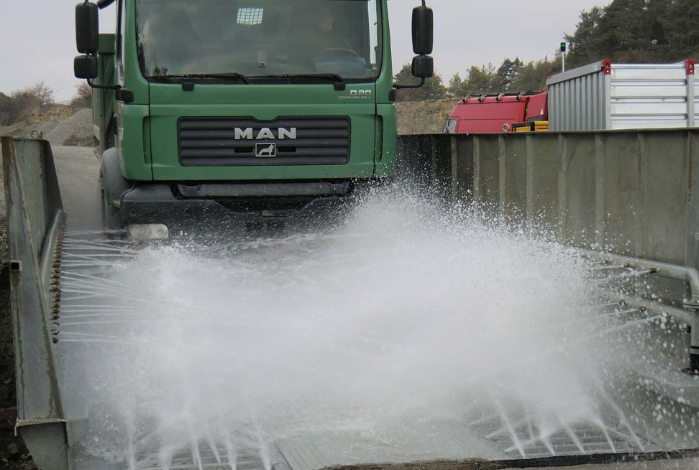How Wheel Wash Systems Help Prevent Track-Out Contamination

Wheel wash systems play a crucial role in preventing track-out contamination, which occurs when vehicles exiting construction sites, mines, quarries, or other locations with substantial dirt, debris, or hazardous materials inadvertently carry these substances onto public roads and surrounding environments. This contamination can lead to several environmental and safety issues. Here’s how wheel wash systems help mitigate these risks:
1. Removing Debris and Contaminants
Wheel wash systems are designed to efficiently remove dirt, mud, and other forms of debris from the wheels and undercarriage of vehicles before they leave the site. By using high-pressure water jets or mechanical brushes, these systems ensure that harmful materials do not escape into the environment.
2. Preventing Pollution
By capturing and treating the wash water, wheel wash systems prevent pollutants from entering waterways and groundwater. This is particularly important for sites handling hazardous materials, as it helps in maintaining the quality of nearby water sources and protects aquatic life.
3. Enhancing Road Safety
Mud and debris carried onto public roads can create hazardous driving conditions, leading to increased risks of accidents. Clean wheels and undercarriages reduce the likelihood of such materials being deposited on road surfaces, thereby enhancing safety for all road users.
4. Compliance with Environmental Regulations
Many regions have strict regulations in place to control the spread of contaminants from industrial and construction sites. Wheel wash systems help businesses comply with these laws by effectively controlling the exit of pollutants, thus avoiding potential fines and legal actions.
5. Reducing Maintenance and Cleanup Costs
By minimizing the amount of debris that leaves a site, wheel wash systems reduce the need for road and environmental cleanups, which can be costly and time-consuming. This also helps in maintaining a positive relationship with the local community and environment.
6. Efficient Use of Water and Resources
Modern wheel wash systems are designed to be water-efficient, often recycling water used in the cleaning process. This not only conserves water but also reduces the operational costs associated with water usage.
7. Adaptability and Customization
These systems can be customized to fit the specific needs of a site, taking into account the type of vehicles used, the contaminants present, and the volume of traffic. This ensures effective cleaning while optimizing resource use.
In conclusion, wheel wash systems are an essential component of environmental protection and site management strategies. They offer a practical solution for preventing track-out contamination, ensuring that businesses can operate responsibly without compromising the safety and well-being of the community and the environment.
8. Improving Public Perception and Corporate Responsibility
The implementation of wheel wash systems is a visible sign of a company’s commitment to environmental stewardship and community safety. By taking proactive measures to prevent contamination and pollution, businesses can improve their public image and strengthen their reputation as responsible corporate citizens. This, in turn, can lead to better relationships with local communities, regulatory bodies, and potential customers.
9. Enhancing Operational Efficiency
By integrating wheel wash systems into their exit routines, sites can streamline their operations and reduce delays. Efficient cleaning processes ensure that vehicles can quickly return to work or exit the site without causing long queues or downtime. This operational efficiency can lead to significant cost savings over time and improve the overall productivity of the site.
10. Supporting Sustainable Practices
Wheel wash systems support the broader goal of sustainable development by minimizing the environmental impact of construction, mining, and other industrial activities. Through water recycling, the reduction of hazardous runoff, and the prevention of soil erosion, these systems contribute to the conservation of natural resources and the protection of ecosystems.
11. Technology Integration and Innovation
Advancements in technology have led to the development of more sophisticated wheel wash systems that offer better performance and efficiency. Features such as automated sensors, adjustable water pressure, and water treatment solutions are now common. These innovations enable more effective cleaning with less water and energy, contributing to the overall sustainability of operations.
12. Future Challenges and Opportunities
As environmental regulations become stricter and public awareness of environmental issues grows, the role of wheel wash systems is likely to become even more critical. Future challenges may include adapting these systems to handle new types of contaminants, improving water recycling technologies, and integrating them with other site management systems for enhanced efficiency and effectiveness. Additionally, there is an opportunity for manufacturers to develop more compact, mobile, and cost-effective solutions that can be deployed in a wider range of settings.
Q: What is track-out contamination?
A: Track-out contamination is the transfer of pollutants from industrial sites to public roads by vehicles, which can harm the environment and road safety.
Q: How do wheel wash systems work?
A: Wheel wash systems use high-pressure water jets or mechanical brushes to clean vehicle wheels and undercarriages before they exit a site.
Q: Why are wheel wash systems important for the environment?
A: They prevent pollutants from reaching waterways, reduce soil erosion, and help comply with environmental regulations.
Q: Can wheel wash systems improve road safety?
A: Yes, by cleaning vehicles before they enter public roads, they reduce debris that can cause hazardous driving conditions.
Q: Do wheel wash systems help with regulatory compliance?
A: Absolutely, they help sites meet environmental regulations by controlling the spread of contaminants.
Q: Are there economic benefits to using wheel wash systems?
A: Yes, they can reduce the cost of road cleanup and vehicle maintenance, enhancing operational efficiency.
In conclusion, wheel wash systems represent a key tool in the effort to mitigate the environmental and safety impacts of industrial and construction activities. By effectively removing contaminants from vehicles, these systems play a crucial role in preventing pollution, ensuring road safety, and promoting sustainable practices. As technology evolves and regulatory pressures increase, the importance of wheel wash systems in protecting our environment and communities is set to grow, highlighting the need for ongoing innovation and commitment from all stakeholders involved.





